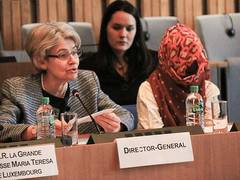
GCED Basic Search Form
Quick Search
Close
You are here
News
Education, the key to preventing and combating violent extremism
Post date:
2016/03/10

The role of education in combating violent extremism and its consequences for girls and women was the common point highlighted by the participants of the round table "Violent extremism and radicalization: women as victims, accomplices and engines of change," held at UNESCO Headquarters as part of its focus on International Women's Day.
Inaugurated by the Director General of UNESCO, Irina Bokova, the President of the Executive Board, Michael Worbs and Grand Duchess Maria Teresa of Luxembourg, the meeting aimed to develop the case of women as architects of peace and shaping a new narrative, while also recognizing the efforts of many women who said "no" to extremism.
"My name is Assiatou. I'm 15 years old. I'm here to tell you my story, because I was abducted by Boko Haram."
These were the opening words of a Nigerian teenager telling her story of escape from the clutches of these extremists and who now lives in neighbouring Niger.
Her face covered, and using a false name to protect her true identity, Assiatou told her story: "When the sect came, they took us to a brothel. We were forty. The men selected girls and we were locked up. It was in this place that someone had chosen me as his wife. They insulted our parents and we were abused. They made us believe that our parents were not strong believers and they were there to teach us the Qur'an. A month later I was forced into marriage. This is the worst moment of my life. (...) To combat ignorance, it is essential to go back to school, so I decided to resume my studies. I would like to become a doctor."
Amina Sa'id, who heads an association that frees abducted women and girls from the minority Yezidi community who were kidnapped in Iraq by Daesh, explained, "Women are the first victims of the wars in the world. They are abused and turned into sex slaves or brainwashed to become suicide bombers."
The organization she heads has, to date, successfully secured the release of 2000 women and children in individual operations, but estimates that 3000 Yazidis are still under the control of the this extremist group in territory it controls in Mosul and the surroundings areas.
The Director-General of UNESCO, Irina Bokova, said women and girls bear a heavy burden. "Women are abused, exposed to sexual slavery, trafficked, forced into early marriages and endure female genital mutilation." She added, "Against violence we must respond with the most powerful tools we have - education, prevention, awareness. (...) The fight against extremism is played out in the mind of each individual, and education is in the frontline to reinforce the defences of each – along with the ability to reject hatred."
HRH Maria Teresa, Grand Duchess of Luxembourg and Goodwill Ambassador of UNESCO for the education of girls and women, emphasized the importance of international cooperation to combat the radicalization of young people.
"No country, big or small, will succeed or be convinced by its own means, as we face a global problem, said the Grand Duchess, adding, “The role of women is essential, they give life, birth. They must be a counterweight to the propaganda of the Islamic State, which promises a society based on a death wish."
The Chairman of the Executive Board of UNESCO, Michael Worbs, reinforced the commitment of the Organization to "educate young people to keep them away from radical forces" and stressed the need to promote educational programs based on "global citizenship, human rights and peace."
Among those participating in the debate, organized by the Division for Gender Equality of UNESCO, were French journalist Kaci Mina, author of the book "Kidnapped by Boko Haram," Professor Feride Acar, a committee member of the Convention on the Elimination of all Forms of Discrimination Against Women (CEDAW), Hanaa Edwar, secretary general of the Iraqi Al-Amal Association, Yosra Frawes, representative of the International Federation of Human rights in Tunisia and Jayne Huckerby, Director of the International Clinic of Human Rights and a member of the Faculty of Law at Duke University in the United States.
URL:
http://www.unesco.org/new/en/media-services/single-view/news/education_the_key_to_preventing_and_combating_violent_extremism/#.VuED6PmLSUk
